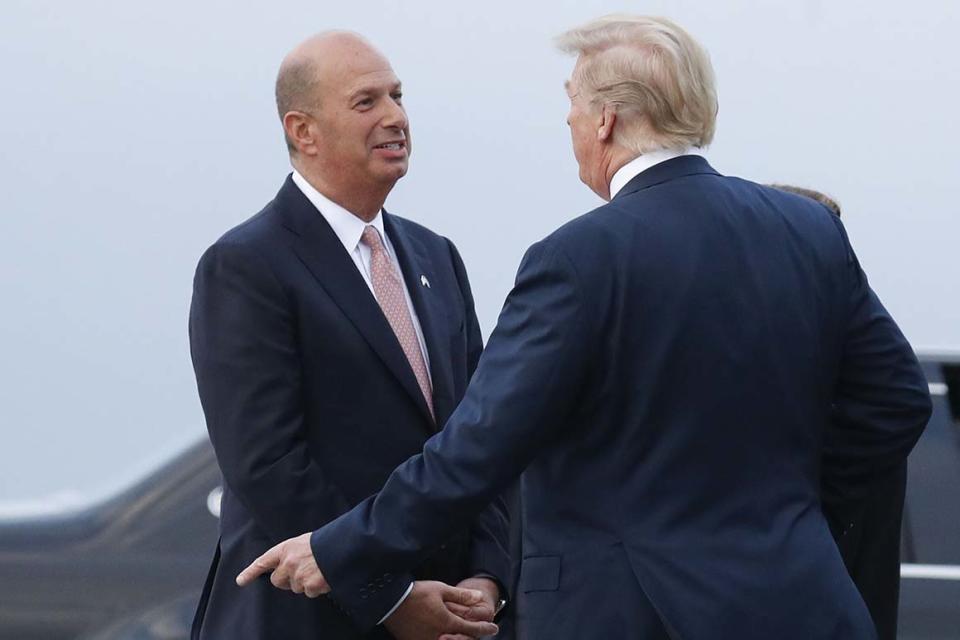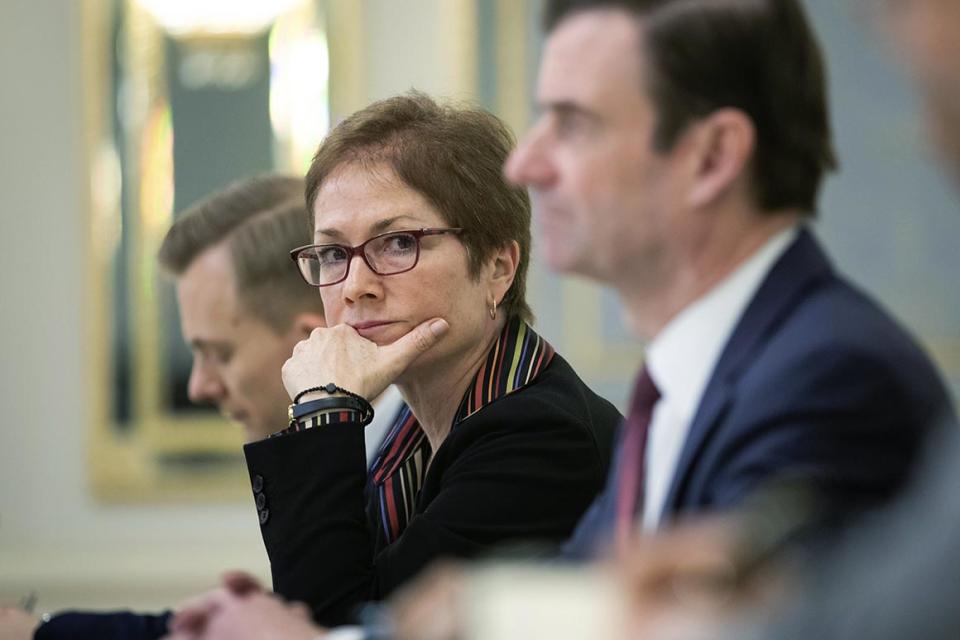Top U.S. envoy ties Trump directly to Ukraine quid pro quo
The top U.S. envoy to Ukraine told House impeachment investigators on Tuesday that President Donald Trump sought to withhold critical military aid to Ukraine and refuse a White House meeting with the country’s president unless he pursued politically motivated investigations into Trump’s rivals.
The diplomat, William Taylor, painted a damaging portrait of events that directly tied Trump to a quid pro quo with Ukraine, according to his prepared remarks obtained by POLITICO and his responses to questions as described by sources in the room for the closed-door testimony.
The timeline Taylor laid out during his nearly 10 hours testifying before investigators is at the heart of Democrats’ impeachment inquiry into the president. The 50-year veteran of government service systematically dismantled Trump’s repeated denials that he sought to leverage American military and diplomatic might to coerce an ally into a coordinated campaign to damage his potential 2020 rival. Trump himself and his congressional allies did not attempt on Tuesday to dispute the substance of Taylor’s claims, which were based on copious notes. Instead, the White House attacked Taylor personally, saying he was part of a band of “radical unelected bureaucrats waging war on the Constitution.”
In his opening statement, Taylor said Gordon Sondland, the U.S. ambassador to the European Union, told him that “everything” — including military assistance to Ukraine and a meeting between Trump and the Ukrainian leader — was contingent on the Ukrainians publicly announcing investigations into Trump’s political opponents. He told impeachment investigators that a White House budget official said on a secure phone call in July that Trump had personally directed that the military aid be withheld.
“It is a rancorous story about whistle-blowers, Mr. Giuliani, side channels, quid pro quos, corruption and interference in elections,” Taylor said, referring to Trump’s personal lawyer Rudy Giuliani, who was deeply involved in the shadow effort.
Taylor also testified that Sondland said Trump personally told him that he wanted Ukraine to “state publicly” that it would open such probes, before the U.S. would release the aid, which is viewed as critical for combating Russia’s aggression in the region. Taylor repeatedly underscored the damage that even a temporary hold on the aid had done to the U.S.-Ukraine relationship, at a time when the budding democracy was resisting an advance by Russian forces and fighting corruption at the highest levels of the government.
“Ambassador Sondland tried to explain to me that President Trump is a businessman. When a businessman is about to sign a check to someone who owes him something, he said, the businessman asks that person to pay up before signing the check,” Taylor said, according to his opening statement.

Taylor’s testimony described the intensity of the efforts among Trump’s allies to persuade Ukrainian officials to launch an investigation targeting former Vice President Joe Biden and another probe centering on a debunked conspiracy theory regarding the 2016 election.
Taylor prompted sighs and gasps inside the secure hearing room when he read his lengthy, 15-page opening statement, two of the sources said. Democrats who emerged from the deposition said the revelations could speed up their impeachment probe.
“The body language of the people hearing it was, ‘holy s---’ — seriously,” Rep. Harley Rouda (D-Calif.), a member of the House Oversight and Reform Committee, said in reference to Taylor’s opening statement.
Rep. Stephen Lynch (D-Mass.), a senior member of the Oversight panel, characterized the testimony as a “sea change” that “could accelerate” the impeachment inquiry. Another lawmaker, Democratic Rep. Tom Malinowski of New Jersey, said it was “the most thorough accounting we’ve had of the timeline.”
“I’ll tell you, as a former State Department political appointee, in my experience the difference between career folks and political appointees is the career folks take very good notes,” Malinowski said, hinting that Taylor provided corroboration to back up his recollections. Lawmakers roundly criticized Sondland, a political appointee and a donor to the 2016 Trump campaign, for failing to recall certain events and conversations during his deposition last week.
Sondland’s lawyer did not respond to a request for comment. Sondland has emphasized that he wants to provide notes and documents to the committee but has been blocked by the State Department.
Congressional Republicans were more muted, but they showed no immediate signs of breaking with Trump despite the latest bombshells.
Rep. Jim Jordan (R-Ohio), the president's lead defender in the room, was tight-lipped as he emerged from the closed-door deposition for a lunch break. He praised what he described as GOP lawyers’ effective questioning of Taylor but declined to say whether it yielded exculpatory information.
White House Press Secretary Stephanie Grisham said there was no quid pro quo, claiming Trump is the victim of a “coordinated smear campaign” by Democrats.
“Today was just more triple hearsay and selective leaks from the Democrats’ politically-motivated, closed door, secretive hearings,” Grisham said in a statement. “Every day this nonsense continues more taxpayer time and money is wasted.”
Trump, who urged Ukrainian President Volodymyr Zelensky to investigate Biden in a July 25 phone call, has long denied the charge that military assistance was used as leverage to bend Zelensky to his will.
Weeks before Taylor testified, it emerged that he had deep concerns that Trump was possibly withholding military aid to the eastern European nation to pressure Ukrainian leaders to launch the investigations — one of which centers on an unsubstantiated claim about the origins of Russia’s interference in the 2016 election.
Taylor, who replaced U.S. ambassador to Ukraine Marie Yovanovitch after her unceremonious ouster by Trump in May, raised alarms with colleagues on Sept. 1 in a text message exchange released earlier this month by the three committees spearheading the inquiry.
“Are we now saying that security assistance and [White House] meeting are conditioned on investigations?” he wondered, referring to a potential meeting between Trump and Zelensky.
Eight days later, Taylor’s concerns grew more urgent. In texts to two other diplomats, Taylor said it was “crazy” that military aid to Kyiv was being blocked in order to force “help with a political campaign.” Nearly $400 million in military assistance to Ukraine was put on hold in late July by the White House but was released in September two weeks after POLITICO revealed that it had been frozen. Taylor described the hold on aid as a “nightmare” and said it had already shaken Ukraine’s faith in the United States.
“The Russians love it. (And I quit.),” Taylor said of the prospect that the aid would be blocked even after Ukraine agreed to open Trump’s preferred investigations.
A source who attended the deposition said a phone call between Taylor and Sondland was a key episode about which Taylor provided new information. That conversation came at Sondland’s request after Taylor, in one of the text messages released earlier this month, questioned whether the military assistance and possible White House meeting are “conditioned on investigations.”

“After today, Mr. Sondland is going to have some explaining to do,” Rep. Raja Krishnamoorthi (D-Ill.) said.
At least one Democrat, Rep. David Cicilline of Rhode Island, said Taylor should testify in public. Democrats have been gathering evidence behind closed doors in the five weeks since Speaker Nancy Pelosi formalized the impeachment inquiry, drawing scorn from Republicans who say the process should be conducted in the open.
The House Intelligence Committee, which is leading the inquiry, issued a subpoena to Taylor early Tuesday morning, according to an official, because the State Department tried to block Taylor from appearing. The official also cited “efforts by the State Department to also limit any testimony that does occur,” adding that Taylor was complying with the subpoena.
Other State Department officials have spoken with investigators under subpoena after the State Department and White House sought to block them from appearing — a sign that the White House’s stranglehold on testimony has begun to slip.
Taylor’s lengthy diplomatic service occurred under Republican and Democratic presidents. He served as ambassador to Ukraine under George W. Bush and Barack Obama from 2006 to 2009. Before that, he held numerous diplomatic posts in the Middle East, advised the U.S. ambassador to NATO and worked on Capitol Hill for former Sen. Bill Bradley. He graduated from West Point and served in Vietnam.
Taylor had left government service for a senior position at the U.S. Institute of Peace but returned to the diplomatic corps in June after Yovanovitch’s ouster. She testified to lawmakers earlier this month that her removal was the result of a smear campaign engineered by Trump allies who portrayed her as disloyal for rebuffing Giuliani’s mission in Ukraine.
Taylor’s two correspondents in the text exchanges — Sondland and former ambassador Kurt Volker — have already testified to impeachment investigators. They painted a portrait of a foreign policy that had been outsourced by Trump to Giuliani. Both described deep discomfort with the arrangement and worried that Giuliani’s freelancing — especially in a country fending off Russian aggression and battling systemic internal corruption — could undermine America’s yearslong diplomatic efforts.
Taylor voiced those concerns in a July text exchange days before Trump called Zelensky, who was elected in the spring on a platform of fighting corruption.
“Gordon, one thing Kurt and I talked about yesterday was Sasha Danyliuk’s point that President Zelenskyy is sensitive about Ukraine being taken seriously, not merely as an instrument in Washington domestic, reelection politics,” he said. Danyliuk is likely a reference to Oleksandr Danyliuk, Ukraine’s former finance minister.
Sondland replied, “Absolutely, but we need to get the conversation started and the relationship built, irrespective of the pretext. I am worried about the alternative.”
After Trump canceled a late August trip to Poland, where he was to meet Zelensky, the ambassadors again fretted about building a relationship between Trump and Zelensky. Volker said he hoped Vice President Mike Pence would attend in Trump’s place and set up a White House visit for Zelensky. He also said he hoped Energy Secretary Rick Perry would join.
But Taylor, on Sept. 1, worried that the White House visit itself would be conditioned on Trump’s demand for Ukraine to investigate Biden as well as an unfounded conspiracy theory that Ukraine — not Russia — interfered in the 2016 election.
As Taylor’s concerns about a quid pro quo grew more explicit, Sondland sought to put him at ease.
“Bill, I believe you are incorrect about President Trump’s intentions. The President has been crystal clear no quid pro quo’s of any kind,” Sondland texted on Sept. 9, urging his colleagues to stop the text message exchanges.
Last week, Sondland told House investigators that he sent this message after speaking directly to Trump and that he could not speak to whether it was true.
Laura Barròn-Lopez and John Bresnahan contributed to this report.

